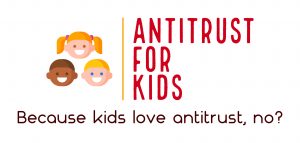Author: Molly Donovan
Mr. Potter grows the best pumpkins in town. They’re big and round, perfect for carving, and specially treated with a patented spray that keeps Potter pumpkins squirrel-free for weeks. Genius!
Naturally, all the kids in town buy their Halloween pumpkins from Mr. Potter’s farmstand. They’re a bit more expensive than the competition’s pumpkins, but the price tag is worth the pumpkin perfection.
One thing the kids don’t buy at Mr. Potter’s farmstand: apple cider donuts. Everyone knows that Potter skimps on the cinnamon and sugar and the donuts are too dry besides. The other donuts available in town are loads better.
Seeing that his donuts were mostly going to waste, Mr. Potter could have exited the donut business altogether, but he considered himself a better business person than that. So, here’s what Mr. Potter came up with: no donuts, no pumpkins.
Eeek! Scary.
Mr. Potter made a sign reading:
One pumpkin + ½ dozen donuts = $12. Pumpkins NOT sold separately.
Mr. Potter felt this was perfectly fair—he should be rewarded for his ingenuity and his climb to the top of the local pumpkin market even if his customers felt a bit coerced to buy his donuts.
And the kids did feel coerced—having no choice but to swallow the undesirable donuts to get the pumpkins they needed for Halloween carving.
The donut competitors in town were equally mad. Mr. Potter’s scheme caused their sales to drop off dramatically, practically excluding them from the donut market, at least during the month of October.
But it is what it is, right?
Wrong. Fortunately for everyone (except Mr. Potter), Mikey’s mom happened to be an antitrust lawyer. (Mikey, age 4, was a connoisseur of both donuts and pumpkins, and was understandably very upset over the whole thing.)
When Mikey’s mom learned of Mr. Potter’s Halloween trick she said: this is an antitrust violation called tying!
Tying can run afoul of state and federal antitrust laws. Generally, tying is where a seller makes the sale of one product (or service) contingent on the sale of another product (or service)—leaving the consumer with no choice but to buy both. In tying analyses, most courts look at whether the seller has appreciable economic power in the tying product (pumpkins) to unfairly restrain competition in the tied product (donuts).
Here’s what happened next. Mikey’s mom approached Mr. Potter—”Look,” she said. “We want your pumpkins, but not your donuts. Don’t you know this is an antitrust violation? Your donut tie-in is anticompetitive.”
Mr. Potter – clever as he is – responded, “I’m simply making my donuts more competitive. My competition is free to sell pumpkins and donuts together, just as I’m doing. And, I have no real market power for pumpkins anyway when considering the entire county’s many pumpkin patches (beyond just our small town). Plus, my supposed tie has no effects beyond the month of October anyway—no harm, no foul. I’ll take the risk.”
But after giving it more thought, even if he could win a lawsuit, Mr. Potter did not want to invite an expensive and burdensome antitrust litigation. So as most antitrust disputes go, the matter was settled. Potter agreed to the following: Potter pumpkins sold at wholesale to all local donut shops. The town’s best apple cider donuts sold wholesale to Mr. Potter. No ties, no tricks. The result: Halloween treats for all sold at competitive prices, and everyone lived happily ever after. Until the next Halloween anyway…
 The Antitrust Attorney Blog
The Antitrust Attorney Blog



